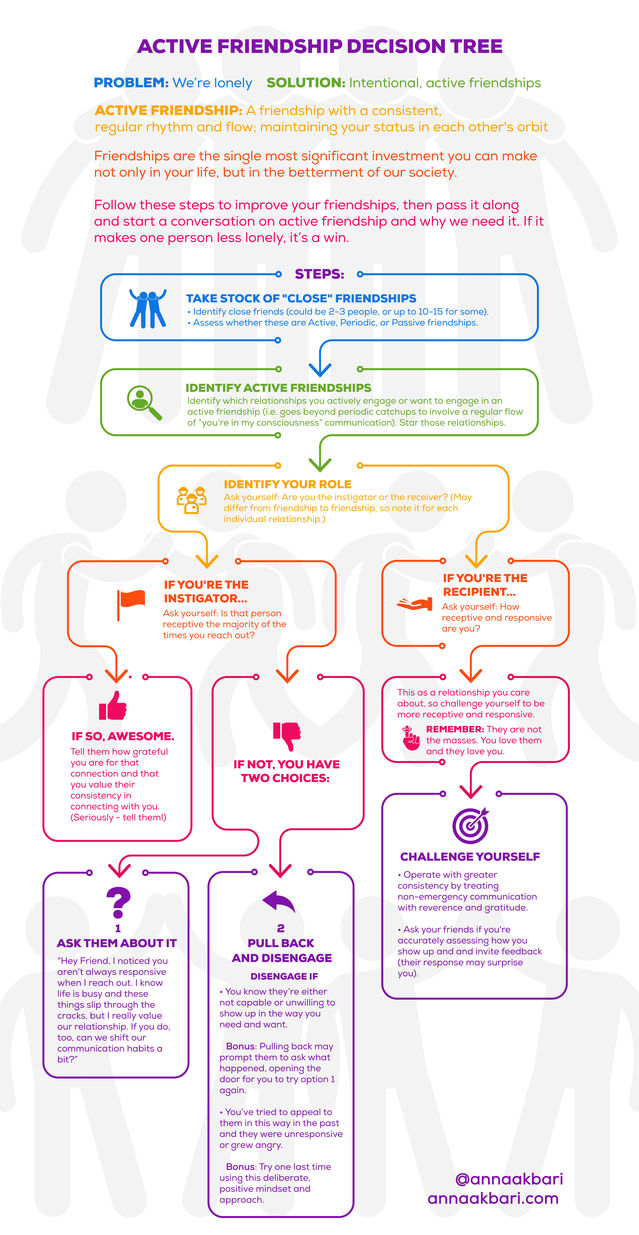Friends
Friendship Is the Answer to Our Connection Problem
Part two: the case for active friendship
Posted August 9, 2019
This is part 2 of my series on the importance of Active Friendship. See part 1 here.
We can all do better at building and maintaining active friendships. Ask yourself how you can be better at showing up—not just when there’s a four-alarm fire like cancer or death (though, yes, that matters, too) but in the day-to-day. Because 99 percent of our lives are the moments in between the crises. Are we proud of how we show up in those moments when we think no one’s looking? When there’s no public record for scrutiny (like there is when we show up at a funeral or send a wedding gift)? What about the fun, casual text exchange? The impromptu, “Hey, I’m in your neighborhood—can I drop by and say hello?”
Yes, we need people when we’re down and out, but let’s also start acknowledging how much we need them to make us laugh, make us think, and keep us company the rest of the time, just because.
What might that look like in action? Again, let’s take me as an example. I love to host things and I love to gather people. I also love to communicate and share curated content and ideas I think are relevant and interesting to specific people in my life. That’s not everyone’s M.O., nor need it be. But that doesn’t mean they're off the hook!
Receiving should be equally active and conscious. If you assess your relationships and you’re neither hosting/sharing nor being responsive to those who are, there’s a problem. You’re likely doing one or more of the following: 1) over-relying on your partner or immediate family to give you everything you need and want from friendship (setting those relationships up for disappointment and strain), 2) isolating yourself, and/or 3) taking people you love/who love you for granted.
I believe, collectively, we can do better.
In an age where our thoughts and intimate lives are most frequently shared digitally with masses of strangers and passive friends, it’s a privilege to have someone think specifically of us and act on that thought. I feel grateful every time someone takes a second to share an idea or resource with me, or to invite me to something or takes a moment out of their day simply to make me chuckle—how lucky am I to be in their consciousness?
So here’s my personal call-to-action, and one I invite you to consider doing, as well:
- Take stock of the friendships you consider “close” (for some it maybe 2-3 people, for others it might be closer to 10-15). Identify those individuals by name. Assess whether—using the above definitions—these are active, periodic, or passive friendships. (Note: not all “close” friendships are active friendships, and not all active friendships are as intimate as some periodic, close friendships. Sometimes that’s ok.)
- From that list of close friends, identify which ones you actively engage or want to engage in an active friendship, which means going beyond periodic catchups to elevate to a regular flow of “you’re in my consciousness” communication. Star those relationships.
- Identify your role and that of your friends in these relationships, and tweak your behavior accordingly. Ask yourself: Are you the instigator or the receiver? (That may differ from friendship to friendship, so note it for each individual relationship.)
- If you are the instigator: Ask yourself if that person is receptive the majority of the times you reach out?
- Tell them how grateful you are for that connection and that you value their consistency in connecting with you. I’m serious—reach out and tell them. Why? How often do any of us get to hear something like that? Rarely to never. I promise you’ll make their week.
- If your assessment reveals they are often not receptive, you have two choices:
- 1) Ask them about it: “Hey Friend, I noticed you aren’t always responsive when I reach out. I know life is busy and these things slip through the cracks, but I really value our relationship. If you do, too, can we shift our communication habits a bit?” —feel free to be less formal, but you get the gist.
- 2) You can pull back and disengage. Perhaps you know they’re either not capable or unwilling to show up in the way you need and want. Or you’ve tried to appeal to them in this way in the past and they were unresponsive or possibly grew defensive. Perhaps it’s worth trying one last time using this deliberate, positive mindset and approach, or maybe you feel it’s a dead end. That’s your call. And it’s possible that completely pulling back will prompt them to ask what happened, opening the door for you to try option 1 again.
- If you are more often the recipient of their initiation: ask yourself how receptive and responsive you are? Since you’ve already flagged this as a relationship you care about and want in your active friendship inner circle, challenge yourself to be more receptive and more responsive. It’s easy to get lazy and take that person and their communication for granted. Remember: they are not the masses; you love them and they love you. Challenge yourself to show them how you regard them with greater consistency by treating even non-emergency communication with reverence and gratitude. Not sure if you’re accurately assessing your responsiveness? Ask your friends and invite them to give you feedback (their response may surprise you).
[I created this nifty infographic so you can share it with your friends or social media networks and start a conversation on active friendship and why we need it. If it makes one person feel less lonely, it’s a win.]

Some of you might be saying I’m overthinking something that should just “happen naturally.” But the state of our collective and individual consciousness tells me that whether it should or shouldn’t happen “naturally” is irrelevant: It isn’t happening. At least not often or consistently enough. And we are suffering as a result.
It’s ok to acknowledge that friends sometimes disappoint us. That’s an uncomfortable truth we don’t often like to admit. We expect families and significant others to occasionally let us down — endless articles and commentaries are written about what to do when that happens, and therapists would go out of business if we stopped endlessly discussing the challenges and disappointments from partners and families! But discussing the role of friendship—and specifically active friendship—in modern society is largely taboo. We’re too often dismissed as “asking for too much” if the topic is introduced. I’d like to change that.
For good measure, I’ll repeat one more time that not everyone can or should be your active friend, and whether they are is not necessarily a reflection of whether they like you or whether they’re a good person and vice versa. But someone needs to play that role for you (beyond your significant other), so it’s time to take stock, name your people, and put in the joyful work necessary to love and support them fiercely—not only when sh!t goes wrong, but during all the underrated in-between times.
Oh, and did I mention that Active Friendship is super fun?? :)
So here’s the TLDR version of this article: We’re lonely. Intentional, active friendships are the answer.
- So reach out to an “active friend” (or would-be active friend) today and tell them how much you value them, why, and what you’re going to commit to doing to continue to nurture your bond.
- Then, coming off that high, reach out to an active friend (or would-be active friend) where that relationship is falling short of your expectations or where you feel you’ve fallen short. Have that uncomfortable dialogue with them (you can totally blame me). And remember: even though it seems like a “tough” conversation, it’s one of the most flattering tough conversations you can initiate, because you’re essentially saying, “I love and value you so much that I’m willing to be vulnerable, put myself out there, and risk rejection — because I think you’re worth it.” Be prepared: They may not want or be able to show up in the way you are looking for, but at least then you can mourn that reality and move on to investing in someone who can and will.
This is an imperfect process, but it’s an important one. Friendship should be a priority, not an afterthought, and I believe it’s the single most significant investment you can make not only in your life but in the betterment of our society.
If you try out this process, I’d love to hear how it works for you in the comments. And if you’ve customized it in some way, please share.




